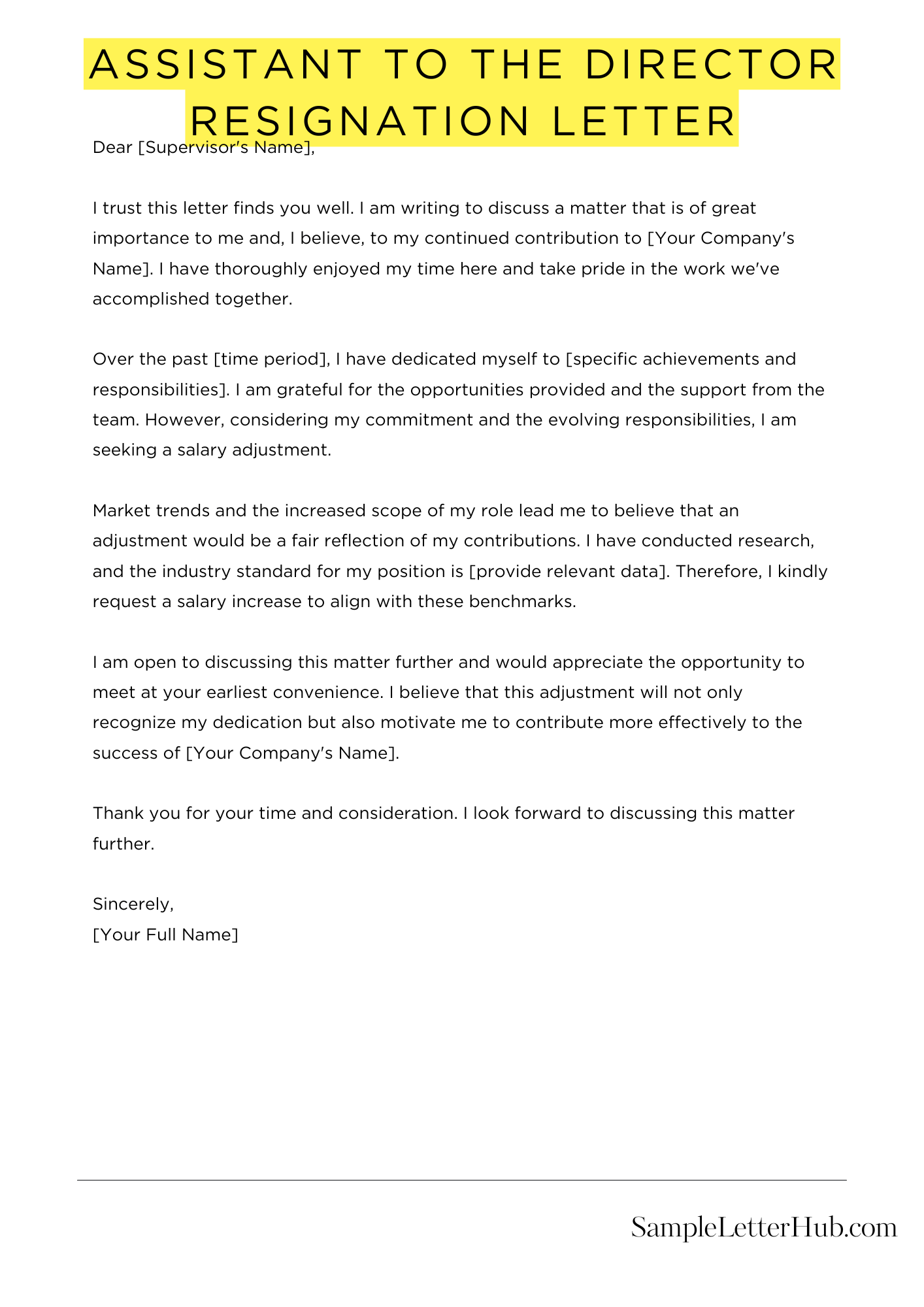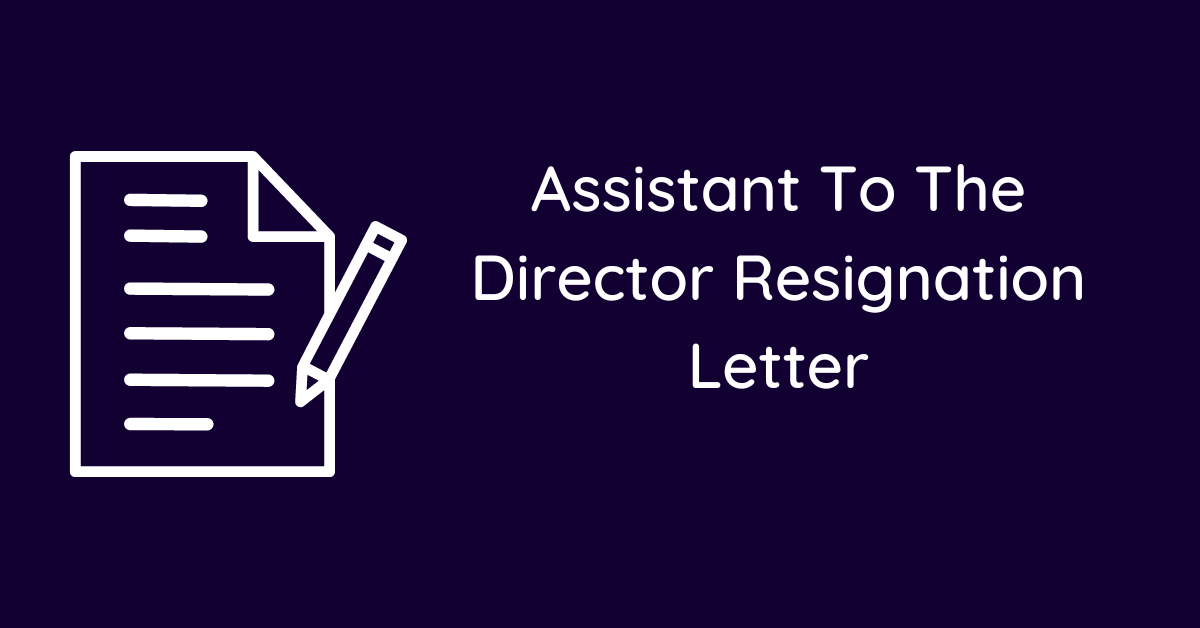Are you looking to write an assistant to the director resignation letter? If so, you’re in the right place. In this article, we’ll share an example of an assistant to the director resignation letter with you.
When it comes to leaving a job, one of the most important things you can do is write a clear and professional resignation letter. This letter should explain your decision to leave and be polite and humble in tone. It’s also important to be specific about your last date of employment.
Below, we’ve shared a template/example assistant to the director resignation letter that you can use. Feel free to adapt it to your own needs.
Assistant To The Director Resignation Letter
Dear Director [Director’s Name],
Please accept this letter as formal notification of my resignation from my position as Assistant to the Director, effective two weeks from today, [date].
During my time at [Company/Organization Name], I have gained invaluable experience and developed professional skills that I am grateful for. I have enjoyed working alongside you and the team, and I appreciate the opportunities I have been given.
I wish you and the company all the best in the future.
Sincerely,
[Your Signature]
Short Assistant To The Director Resignation Letter Sample
Please accept this letter as formal notification that I am resigning from my position as Assistant To The Director at [Company Name]. My last day of employment will be [Your Last Day]. Thank you for the opportunity to grow and learn during my time here. I wish you and the company continued success. I am happy to assist in the transition process to ensure a smooth handover of my responsibilities.
I wish you all the best with your assistant to the director resignation letter.
When it’s time to say farewell, expressing your gratitude and best wishes can make the transition smoother:

How to Write an Assistant to the Director Resignation Letter
Leaving a position, especially one as demanding as an assistant to the director, can be a daunting task. However, crafting a well-written resignation letter can make the process smoother. Here’s a comprehensive guide to help you draft a professional and effective letter:
1. Start with a Formal Introduction
Begin your letter with a formal salutation, such as “Dear [Director’s Name].” Clearly state your intention to resign from your position as assistant to the director and provide your last date of employment.
2. Express Gratitude and Appreciation
Take this opportunity to express your sincere gratitude for the opportunity to work as an assistant to the director. Highlight the valuable experiences and skills you’ve gained during your tenure. Mention specific projects or initiatives you’ve contributed to, demonstrating your impact on the team.
3. State Your Reasons (Optional)
While it’s not necessary to provide detailed reasons for your resignation, you may choose to briefly mention your motivations. Keep it concise and professional, focusing on positive aspects such as pursuing new opportunities or personal growth.
4. Offer Assistance with the Transition
Demonstrate your commitment to a smooth transition by offering to assist in any way possible. This could include training your replacement, providing documentation, or answering any questions during the handover period.
5. End with a Professional Closing
Conclude your letter with a formal closing, such as “Sincerely” or “Respectfully.” Include your typed name and signature below. Proofread your letter carefully before submitting it to ensure it’s free of errors.
Assistant To The Director Resignation Letter: 6 FAQs Answered
Resigning from a position as an assistant to the director can be a daunting task. To help you navigate the complexities of this process, we’ve compiled a list of the six most frequently asked questions and their answers.
1. What is the proper format for an assistant to the director resignation letter?
A resignation letter should include your name, position, date of resignation, and a brief statement expressing your gratitude for the opportunity to work in the role. It’s also customary to offer a two-week notice period.
2. What should I include in the body of my resignation letter?
In the body of your letter, you can elaborate on your reasons for leaving, such as pursuing a new opportunity or seeking more growth and responsibility. Keep your tone professional and respectful.
3. Should I offer to help with the transition?
Yes, it’s a good idea to offer your assistance in ensuring a smooth transition during your notice period. This could include training your replacement or providing documentation on your responsibilities.
4. What if I’m feeling emotional about leaving?
It’s understandable to feel a range of emotions when resigning from a position. However, it’s important to maintain a professional demeanor in your resignation letter. Express your gratitude and well wishes for the company’s future.
5. Should I submit my resignation letter in person or via email?
Submitting your resignation letter in person is generally considered the most formal and respectful approach. However, if you’re unable to do so, sending it via email is acceptable.
6. What should I do after submitting my resignation letter?
After submitting your resignation letter, continue to perform your duties diligently during your notice period. Maintain a positive attitude and offer your support to your colleagues and the company.
Before making the decision to resign from your job, it’s essential to consider the legal aspects:
Understanding your emotions after quitting your job is important. Explore why you might be feeling sad:
Related
- Resignation letter sample
- Forced resignation letter
- Resignation letter due to going abroad
- Resignation letter due to marriage
- Resignation letter due to other opportunity
- Resignation letter due to mistake

